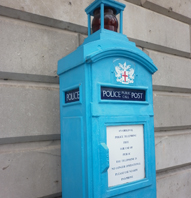Almost all forces are good at preventing crime and anti-social behaviour; but quality of investigations remains disappointing, according to a report by Her Majesty’s Inspectorate of Constabulary into police effectiveness.
Forces are mostly good at tackling serious and organised crime (although they are generally better at ‘traditional’ organised crime, such as drug-dealing, than so-called newer areas, such as child sexual exploitation and cyber-crime.
To view your local force’s report, visit http://www.justiceinspectorates.gov.uk/hmic/publications/police-effectiveness-2015/.
HM Inspector of Constabulary Zoë Billingham, who led the inspection, called it one of the most wide-ranging inspections ever by HMIC. She said: “Almost all forces are good at preventing crime and anti-social behaviour. Successful prevention means fewer crimes; and fewer crimes means fewer victims, and so more people are kept safe. This is at the heart of what the police are here to do. But I need to raise a warning flag here. Forces’ good performance in preventing crimes is at risk if neighbourhood policing is further eroded.
“Front-line neighbourhood police officers have told us repeatedly that they are being pulled from their vitally important preventative work in communities to fulfil other duties, like guarding crime scenes, spending time in stations investigating crimes or staffing police station front counters. Losing our eyes and ears in the community is only likely to hamper good performance in preventing crime.
“Police leaders need to take heed of HMIC’s early warning and make sure that neighbourhood policing – the cornerstone of the British policing model, is preserved for future generations. In addition, more than a third of forces are judged to require improvement in how they investigate crime and manage offenders, with backlogs and delays in the units which extract and analyse evidence from digital devices a particular concern. We found a similar picture last year; it is disappointing not to see more progress.”
For the National Police Chiefs’ Council, Merseyside Chief Constable Sir Jon Murphy said: “We always aim to prevent harm rather than responding once it has happened so we are pleased that Her Majesty’s Inspectorate of Constabulary (HMIC) have found that the vast majority of police forces are good at preventing crime and anti-social behaviour. Forces have been working with our partners in health, social services and education to intervene early to deal with the causes of crime and this will be a key focus for policing in the next five years.
“HMIC’s assessment of police effectiveness also found good performance in tackling serious and organised crime and big improvements in our response to domestic abuse.
“Neighbourhood policing is vital in preventing crime, anti-social behaviour and terrorism. Police chiefs have protected it when responding to previous budget cuts and are now considering the best way to deliver effective preventative policing in their communities while managing increasing demand in investigating complex, resource intensive crimes. All chiefs agree that the positive effects of neighbourhood policing should continue but we also must respond to calls for help and prioritise based on threat, risk and harm so we have to manage our resources accordingly.
“The NPCC is working with police and crime commissioners (PCCs) to lead further reform of policing so that it is able to tackle new threats and improve the service to the public. As part of that work, we are committed to improving digital investigations. We are working the College of Policing and PCCs to address delays in recovering digital evidence and improve processes for identifying and supporting vulnerable victims. We are dealing with a huge increase in the volume of digital evidence related to everything from traffic offences to child sexual abuse, which we need to prioritise based on the risk to the public, so this is a complex issue to address.”
Jack Dromey, Labour’s Shadow Policing Minister, said: “David Cameron cannot afford to ignore this warning. This report shows how his reckless cuts are eroding neighbourhood policing in communities. The police are now spread so thinly that they are struggling to act as ‘eyes and ears’ on our streets – undermining, just when national security is at risk, efforts to counter the threat we face from terrorism. It is the worst possible time to slash bobbies on the beat.
“Britain has already lost over 18,000 police officers under David Cameron and, with thousands more set to go, Tory Ministers want to plug the gaps in the blue line with volunteers. The Prime Minister has broken his promise to protect frontline officer numbers. He is letting the British people down and his actions have the potential to put them at risk.”
More details
Effectiveness is the final part of HMIC’s annual inspections into police efficiency, effectiveness and legitimacy (PEEL) to be published. Visit http://www.justiceinspectorates.gov.uk/hmic/publications/police-effectiveness-2015/.










